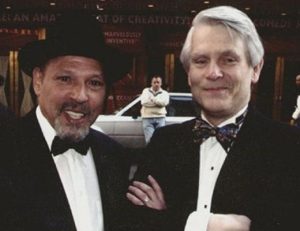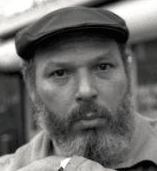By August Wilson
Directed by Montae Russell
Outdoors at August Wilson House
Indoor Saturday matinees at Madison Arts Center
August 10 – September 14 2024
A coproduction with

Real estate developer Harmond Wilks is determined to become the first black mayor of Pittsburgh, on a mission to revive his blighted childhood neighborhood. As Wilks confronts characters from the past, he is forced to question how pursuing change could put his neighborhood’s history at risk.
Cast
| Harmond Wilks | Roosevelt Watts Jr. |
| Mame Wilks | Dominique Briggs (at some performances) |
| Mame Wilks | Karla C. Payne (at some performances) |
| Roosevelt Hicks | Rich Dickson |
| Elder Joseph Barlow | Mike Traylor |
| Sterling Johnson | Maurice Redwood (at some performances) |
| Sterling Johnson | Sam Lothard (at some performances) |
Setting
The office of Bedford Hills Redevelopment in the Hill District of Pittsburgh, PA. 1997.
From the Artistic Director
In 2024 our city finds itself at the pinnacle of what the protagonist of this play dreamed of reaching. Nearly two decades after this play’s inception, Pittsburgh finally has its very first black mayor.
Radio Golf is the final chapter in August Wilson’s century-spanning series of plays that captured black life and black culture.
This production of Radio Golf puts us one play away from producing Mr. Wilson’s complete American Century Cycle for the second time! We’re extremely fortunate and grateful to both the August Wilson estate and August Wilson House to be able to produce Mr. Wilson’s work not only in Pittsburgh’s historic Hill District but also in the backyard of his childhood home.
We’ve put together a cast of some of the nation’s finest actors paired with a Pittsburgh native and Wilsonian actor/director to bring Mr. Wilson’s words and characters to life.
We appreciate your presence and your support of our efforts. Please enjoy your time with us and please spread the word.
Mark Clayton Southers
About Radio Golf
By Christopher Rawson, theatre critic and co-author of August Wilson: Pittsburgh Places in His Life and Plays
Art vs. money is one of the central conflicts in Radio Golf, the final installment of August Wilson’s epic Pittsburgh Cycle. Ambition has led to financial success for Roosevelt Hicks, who’s happy to let the white man use him if there’s money to be made. But in Harmond Wilks, a lawyer, real estate dealer, urban developer and wouldbe politician, we meet the middle class complete with inherited position and an ivy league education.
You can hear this as Harmond and his wife Mame talk about drinks with friends or sing pop songs like “Blue Skies.” But in joining the American bourgeoisie, Wilson says they risk losing their souls. In the relationships of commerce to spirit, individual to group and past to future, Radio Golf ends the Pittsburgh Cycle by dumping the past century’s hopes and frustrations right in the laps of this middle class.
In 1997, Bedford Hills Redevelopment is on Centre Avenue in the Hill District. Harmond and Roosevelt plan a 180-apartment high rise with integral urban mall including Whole Foods, Barnes & Noble and Starbucks. But on the Hill, any development raises past spasms of destructive “urban renewal,” characterized in sardonic Hill folklore as “urban removal,” as in Two Trains Running and Jitney.
Even small details show how thinly middle class modernity lies atop an angry past. The play is a struggle for Harmond’s soul, which is to say, the soul of his class and community. But is it a community? “The Hill District’s dead,” says Mame, who wants Harmond to leave it behind in his campaign for mayor. In Roosevelt’s view, community has been replaced by the individual. The play’s title derives from his discovery of an individual game that has historically been the preserve of the white middle class. But in the long struggle for Black civic and economic rights, golf is really access to the country club and the backroom deal. A newly-minted Mellon Bank vice president, Roosevelt thinks he’s gained access to capitalism’s inner sanctum. But isn’t he just a Black front man for white money?
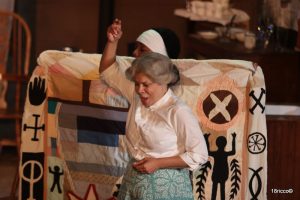
Enter Sterling Johnson, Old Joe Barlow and Aunt Ester’s house at 1839 Wylie Avenue, the ramshackle old mansion whose past is connected to the Hill’s historic soul. Although Radio Golf reads like a commentary on a real-life Pittsburgh development struggle, the mansion is fictitious: its address refers to the 1839 revolt on the slave ship Amistad. In Mr. Wilson’s Gem of the Ocean, Two Trains Running, and King Hedley II, it was the home of Aunt Ester (an-cestor), last in a line of spiritual healers reaching back to 1619, when the first African slaves were brought to Virginia. They were repositories of trial and tribulation, wisdom and solace.
Aunt Ester died in 1985. Her absence signals the loss of cultural tradition and spiritual life. The urgent question, just as with the piano carved with the saga of slavery in Mr. Wilson’s The Piano Lesson, is who owns the house? Who owns the legacy of Black oppression and achievement? Who makes decisions for the Black community? When Harmond discovers Aunt Ester’s house, he doesn’t fully realize the cost of tearing it down. Sterling does. He was the young central character in Two Trains Running, studying Black is beautiful, who found peace by going to Aunt Ester for spiritual advice.
Now, Sterling appears as Harmond’s contemporary, with memories of their being together at St. Richard’s School (which Mr. Wilson attended, grades 5-7). His age doesn’t dovetail with that prior appearance, but his early history and philosophy make him the perfect adversary for Roosevelt. He has street smarts, as when he needles Harmond: “White crimes, white lawyer, country-club jail. Black crimes, black lawyer, Western State Penitentiary.” He also has a firm moral compass: “You ain’t got to study up on right and wrong.”
In this conflict, Mr. Wilson performs the Shakespearean balancing act of giving both Sterling and Roosevelt a compelling statement in the play’s electric, final showdown, as they each define “Negro” and “nigger.” The crux of the issue is right there: Roosevelt refuses to be part of any “us” except for one defined by success. He’s a classic capitalist.
Harmond gradually responds. He recovers the past, guided by Old Joe, who speaks in garbled, emblematic ways of deeper values. Thrillingly, they discover they’re related. Old Joe is the son of the last Aunt Ester, who we met as Black Mary in Gem of the Ocean, and Harmond is the grandson of her older half-brother, Caesar Wilks. Mr. Wilson makes the conflict between past and present, commerce and spirit both messy and personal. But isn’t the past always personal? The spiritual heart of the play rests in Old Joe, always striking out on tangents that lead straight to important truths. The reunion between him and Harmond is the emotional heart of the play.
As Roosevelt plans to go ahead with the demolition which Harmond has tried to stop, Sterling plans a community paint party to frustrate the bulldozers. He paints his face: “I learned that from Cochise,” he tells Roosevelt. “We on the battlefield now.” Harmond decides to join Sterling’s demonstration. But first (not in the text, but cited in a footnote), he paints his face with the same warrior stripes, picks up a brush and marches out. He’s joining the August Wilson cadre of those who know that you can move forward only in tune with the past. He has discovered who he is.
That final exit is not just Harmond’s return to his roots or our farewell to the 10-play cycle, but also the playwright’s farewell. As he revised, he knew Radio Golf was his own end, too, so he indulges himself. All the plays are shot through with allusions to the people, places and events of the Hill and of Mr. Wilson’s life, but here he takes that further, seeding the text with dates of private significance.
By having Harmond join the struggle (perhaps a lost cause, but still the right cause), Mr. Wilson re-dedicates himself. We recall that he considered himself a warrior, hardened in the Black Power movement of the 1970s. In Pittsburgh, that found urgency in the specific ways a creative and resilient community had its heart crushed. So as Radio Golf ends, we don’t know whether Aunt Ester’s house will be saved. Is the juggernaut of commerce unstoppable?
Mr. Wilson was not optimistic. After the end of the play, he said, “I think the bulldozer might come and the police … that’s usually the way it goes.” But he also said that his “idea behind the play” was that in the 21st century, “we can go forward together.” Symbolically, he said, “1839 will always be standing, as part of our repository of wisdom and knowledge that we as an African people have collected.”
One of the things with Radio Golf is that I realized I had to in some way deal with the black middle class, which for the most part is not in the nine other plays. My idea was that the black middle class seems to be divorcing themselves from that community, making their fortune on their own without recognizing or acknowledging their connection to the larger community. And I thought: We have gained a lot of sophistication and expertise and resources, and we should be helping that community, which is completely devastated by drugs and crime and the social practices of the past hundred years of the country. I thought: How do I show that you can go back and that you can’t—
August Wilson
August Wilson’s American Century Cycle
1904 – Gem of the Ocean
1911 – Joe Turner’s Come and Gone
1922 – Ma Rainey’s Black Bottom
1936 – The Piano Lesson
1948 – Seven Guitars
1957 – Fences
1969 – Two Trains Running
1977 – Jitney
1985 – King Hedley II
1997 – Radio Golf
The Making of Radio Golf
By Kimberly C. Ellis, Ph.D.
“So, is that what you and Paul are going to do? You are going to stay in the Hill District? You’ll live here?”
“Yes, Uncle Freddy! We are going to renovate Grandma’s house and I will find a place eventually.”
“Okay, okay… that’s alright, that’s good…”
He was Uncle Freddy to me and August Wilson to the rest of the world. We were talking about my brother’s and my plans to continue to live in the Historic Hill District, the home of our youth, since we moved from the Bronx, New York, where we were born.
August Wilson was both surprised and delighted that I told him we were going to stay in the Hill. We all knew his story— that he had left the Hill and departed Pittsburgh because, as he described it, “there were too many ghosts.” I was far too optimistic, excited, enthusiastic and, as I would come to understand many years later, naive, to understand what that meant or to believe I would ever feel that way about my neighborhood.
That was in 2004. Uncle Freddy had finished Gem of the Ocean, which had a short run on Broadway, which I found personally disappointing, as I thought it was his greatest and best play yet. “Well, you can’t get to a closing without having an opening,” he would say, in his usual humble way. He never took anything for granted and wanted to remind me to be thankful that Gem of the Ocean had a run at all.
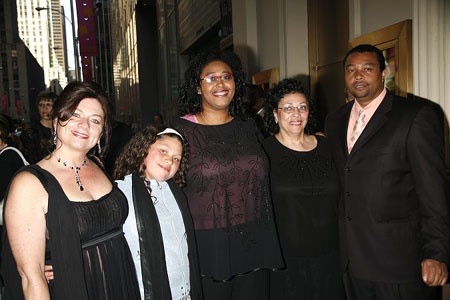
August Wilson had come to the Radisson Hotel, occupied the penthouse suite, which overlooked the Hill District, giving an especially nice view of Bedford, Webster and Wylie Avenues. He had come to do research for the last play in his ten-play cycle—-Radio Golf, except it did not yet have a name.
He asked me many questions, the last of which I already highlighted above. but one of the first questions he asked was to put him in touch with a journalist who knew about Pittsburgh. I put him in touch with Brentin Mock, who has his own story to tell about it, I’m sure. After they met, my uncle embarrassed me by calling me and telling me he was impressed with the young man and suggested that I date him. I burst out laughing out of both nervousness and embarrassment and because he knew it reckoned a criticism I had levied to him about his male characters.
“Why are so many of your male characters so bold. They never just ask a woman out, they tell her and the world, ‘I’m gonna marry her!’” Wilson found my critique to be hysterical and he laughed very hard about it. I joined in on the laughter. He then replied, “The women don’t HAVE to accept, but that’s just these men telling them what they want!” I’m not sure if I ever told Brentin what my uncle said, but I assured Uncle Freddy that Brentin was a fine candidate for my affections. As the world turned, however, Brentin and I became good friends and colleagues and he is happily married with a beautiful family.
Another instance that affected Wilson’s writing of Radio Golf is that he had gotten a bit ill when he was in town and sometime during the early evening, I got a call from my mother, Freda Ellis, who said, “Uncle Freddy is sick but doesn’t want to go to the hospital. Do you know anybody?” And I did. I called up my friend who was a doctor and asked him if he could see my uncle that evening, apologizing for the lateness of the hour. He agreed to do it, but no sooner did I hang up with him that Uncle Freddy was calling me, saying he was going to tough it out himself and had picked up something to help him. He then immediately began questioning me and diverted the attention away from him.
“So, you have a doctor friend you can just call and they were going to come and see me?”
“Yes, Uncle Freddy, and I haven’t even told him that you have changed your mind about it yet.”
“I like that. That’s cool, man, that you have doctor friends in your network and you can just call them up like that.”
I had not thought too much about it because I had attended Emory University, which is a pre-med and pre-law institution, so at least half of my college friends were doctors.
Conversations like these influenced my uncle as he wrote his first play highlighting the Black middle class in the Hill District. Here I was, a Doctor of Philosophy, teaching at the University of Pittsburgh, and my brother had earned his Juris Doctorate and was working as a lawyer and an entrepreneur. We had both decided that the Historic Hill District and all of its possibilities were enough for us, even in spite of the neighborhood being half-empty, filled with vacant lots and absentee landlords, with both excellent and questionable political and civic leadership, especially in the realm of development.
In the years since August Wilson’s death on October 2, 2005, my enthusiasm, hope and determination to make my neighborhood a better place waned. The Hill District sunk further into the exact opposite of gentrification—-rot-tification. In spite of our hard work and optimism many years before, the houses remained dilapidated and broken down, with many historic buildings left for the vines to envelop and wrestle to the ground like it was a competition. And we were still a food desert, now going on 25 years
I served over and over and over again on a number of different committees, helping to make many plans which never came to fruition. not even the greatest plan, which was the Hill District’s Community-Based Masterplan. We were supposed to be the first community-based plan in the city and then “something” happened which stalled it. Now, in 2024 we are just concluding the process.
*****
Wilson warned us of these dynamics in Radio Golf, where friends become enemies and must be warned, “Don’t take no wooden nickels.” But his call, to stand with one’s community, however so defined, is still an important task at hand, especially if the hand is holding a paint can and is bent on repairing homes in the community and restoring historic properties with the approval of the community, without a singular one costing $100 million dollars, holding the entire neighborhood hostage, as a result.
But what Wilson could not have foreseen, that many years later, the ghosts of urban renewal would come to a head and members of the Historic Hill District would collectively redefine its own history and recompense. Wilson also could not have predicted that the Lower Hill Redevelopment—-only the second development in the history of Pittsburgh on that site, would have the opportunity to get it right this time. There would be no need for wooden nickels when eleven members of the Historic Hill District community would be working on the same project and across various sectors from government to architects, contractors, management, marketing and employees, making “community development” mean so much more than a singular organization. Wilson could not have predicted that the son of his friend, Sala Udin, would become a developer in his own right and that his Olmec Development Company could build residential housing and more, on the very street from which his family was displaced in the Lower Hill.
Wilson could not have predicted that Bethel A.M.E. Church, one of the clear organizing institutions in the Historic Hill District’s abolitionist Community, which hosted the “Colored Conventions,” gave birth to Martin Delany, The Mystery newspaper and Frederick Douglass’ The North Star publication, as well as the Underground Railroad in Market Square—-would organize and advocate for “a seat at the table” and be given not only the equivalent of their land back but even more, to develop a mixed-use, affordable housing site in the Lower Hill from which they had suffered eminent domain abuse in the 1950s.
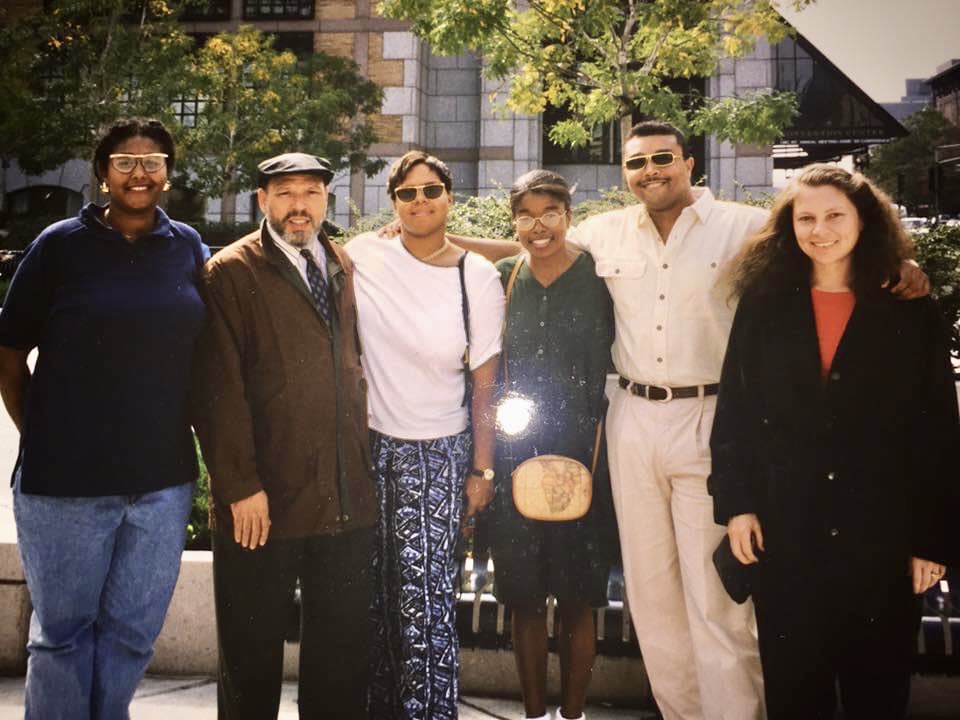
And August Wilson surely could not have predicted that his own niece would be one of the persons shepherding and guiding the entire project for the benefit of many aspects of the Historic Hill District Community—as Director of Community, Arts and Culture for The Buccini Pollin Group, the developer. And perhaps most important, that Bomani Howze of Olmec Development and Dr. Kimberly Ellis of Dr. Goddess Arts and the Historic Hill Institute, were directly recommended to these positions, by the great grandson of Mr. Robert Lavelle, the great civil rights leader and owner of Lavelle Realty and Dwelling House Savings and Loan, which is largely responsible for populating so much of the home ownership throughout the Hill District.
I remember when I was being asked to join the team. I asked about the adherence of the Lower Hill Redevelopment to the Community Collaborative Implementation Plan (CCIP), precisely because I was leery of any big corporation. I had seen Radio Golf, plenty of times. I was so concerned, I had the CCIP attached to my contract, so I would never have to betray my community.
Radio Golf offers a cogent exploration of the dynamics that can go into urban redevelopment. As Wilson said, he is not an historian and does not write history. He would be profoundly impressed with not only the continued challenges of our day but how each of the entities in the Historic Hill District have remained steadfast to their principles and are making the city, as well as its new Black mayor, Ed Gainey, responsive to all of their concerns. There is no one path to redevelop our neighborhood. While I have since gone on to explore living in other places in the world, the Historic Hill District still remains my home and the August Wilson House is the completed and restored historic preservation project that serves as the anchor of the Historic Hill District. We are proud of our accomplishments and what the future holds.
To read more of the upcoming memoir, visit HistoricHill.com
—- Kimberly C. Ellis, Ph.D.
Maternal niece of August Wilson,
Historian, Writer, Educator
Director of Community, Arts and Culture for The Buccini/Pollin Group
Executive Director, Historic Hill Institute
About the Cast

Dominique Briggs (Mame Wilks) is excited to return to Pittsburgh Playwrights Theatre Company as Mame in August Wilson’s Radio Golf. She has appeared in numerous theater productions including The Nacirema Society, August Wilson’s Joe Turner’s Come and Gone, the inaugural production of Shantytown, A Man of No Importance, The Green Book, Kalopsia the Musical, The Ballad of Emmett Till, August Wilson’s King Hedley II, and the inaugural production of Savior Samuel. She also served as the assistant director of the Pittsburgh Public Theater’s 2024 production of The Coffin Maker and the 2022 production of A Raisin in the Sun. Film appearances include Southpaw, House of Stones, and Set Free. Dominique is also a children’s author, writing her first children’s book, Rhea the Great Detective and the Case of the Missing Mrs. Bearington, released March 2019 then later converted to a TV/film pilot in March 2021. When not acting or writing, Dominique serves as the associate producer of Demaskus Theater Collective, loves performing as a voiceover artist, and serves as Sr. Manager of Public Works and Partnerships at the Pittsburgh Public Theater.

Rich Dickson (Roosevelt Hicks & Choreographer) is excited to join Pittsburgh Playwrights for August Wilson’s Radio Golf. He is a graduate of Carlow University with an MBA in Project Management and a proud member of Omega Psi Phi Fraternity Inc. He takes classes at the Professional Actor’s Studio under the direction of Nick Conti and Matt Skollar. Some of his previous theatre appearances include The Green Book, Dinah, and Our Song. He can also be seen on Netflix’s Rustin, Starz’ BMF, and other shows to include Sistas, Mayor of Kingstown, and Lee Daniels’ The Deliverance. Rich is managed by Docherty Talent Agency.

Sam Lothard (Sterling Johnson) Born in Youngstown/Campbell Ohio, Sam is now a proud Pittsburgher. If you are a fan of Pittsburgh Playwrights Theatre, then hopefully you’ve seen Sam perform in some of the many productions he’s been in with PPTCO over the years. You may have seen Sam as Slow Drag in August Wilson’s Ma Rainey’s Black Bottom, and as Mister in King Hedley II, also as Seth Holly in Joe Turner’s Come and Gone. Sam played David in Mark Southers’ award-winning film Cyril (R.I.P. Cyril Wecht, we miss you already). Not only a Wilsonian actor, Sam is also a Shakespearean actor as well, having done Shakespeare’s As You Like It with PICT. Sam performed in Dr. Maya Angelou’s I Know Why the Caged Bird Sings and John Steinbeck’s Of Mice and Men, both with Prime Stage Theater. Sam enjoyed his experience performing in Lorraine Hansberry’s A Raisin in The Sun with Pittsburgh Public Theater. Sam is super excited to work on Radio Golf with the director and cast whom he considers his theater family, yet again! “Put God first. Shoot your shot. Chase your dreams.” Big Sam

Karla C. Payne (Mame Wilks) is an actor, voice-over artist, and poet who has appeared in countless productions for several theater companies, including The Barnstormers Theatre (New Hampshire), City Theatre Company, New Horizon Theater, and Pittsburgh Playwrights Theater Company, where she most recently appeared as Martha Pentecost in the 2023 production of August Wilson’s Joe Turner’s Come and Gone. Karla also notably portrayed Beverly Jenkins in Chicken and Biscuits, produced by New Horizon Theater in spring 2023, and was featured in a film short entitled As I Please, scored by the Grammy Award-winning Pittsburgh Symphony Orchestra. In 2023, Karla launched her company, InnerVizions Coaching & Wellness LLC, providing performance and life coaching for actors. She has also written an ebook entitled The Zen Actor’s Guide: Unleashing Your Inner Confidence for Fearless Performances. Karla is a member of Alpha Kappa Alpha Sorority, Incorporated and the Pittsburgh chapter of The Pierians, Incorporated.

Maurice Redwood (Sterling Johnson) is thrilled to be back on the PPTCO stage for the second year in a row, after previously portraying Jeremy in last year’s production of August Wilson’s Joe Turner’s Come and Gone. Also an accomplished filmmaker and director, he released his first feature film, House of Stones, on YouTube in 2024. Maurice, along with his brother Carter, was a 2023 August Wilson House fellow at Duquesne University in partnership with August Wilson House. Notable stage and screen credits include: Stage – August Wilson’s Fences, August Wilson’s Jitney, August Wilson’s Joe Turner’s Come and Gone (Pittsburgh Playwrights Theater Co.), One Flew Over The Cuckoo’s Nest (Barebones Production Co.), Lower Ninth (Caravan Theater of Pittsburgh), Shakespeare’s King Lear (Pittsburgh Irish & Classical Theater), Pill Hill (New Horizon Theater), and Black Nativity (Shona Sharif African Dance & Drum Ensemble); Film – House of Stones (Redwood Media Group), Per-Sep-Shuhn (TeeJay Vision Films), Chocolate for Life (UWebTv Studios). “Many thanks to Mark, Montae, the entire cast & crew, and most importantly my family! I am honored and humbled to breathe life into Mr. Wilson’s words.”

Mike Traylor (Elder Joseph Barlow) is celebrating fifty-one (51) years in the biz. For the past two (2) years Mike has had the honor of performing at the August Wilson House in Jitney and Joe Turner’s Come and Gone. Radio Golf marks his 9th play by Mr. Wilson. Favorite roles include Estragon in Waiting for Godot, Shylock in The Merchant of Venice, and Booth in Topdog/Underdog. As director, favorites include Funnyhouse of a Negro, The Amen Corner, The Maids, and A Midsummer Night’s Dream in which he also played Oberon. He has written a collection of horror screenplays (investors wanted). He has a degree in theatre from Northern Arizona University.

Roosevelt Watts Jr. (Harmond Wilks) was last seen as Montrellous in Lynn Nottage’s play Clyde’s with the Boise Contemporary Theater in Boise, ID. He was featured as Herold Loomis with Pittsburgh Playwrights Theater Company in Joe Turner’s Come and Gone in August 2023 in Pittsburgh, and for Black Theater Troupe in Phoenix, Arizona. He appeared as Shealy in the stage play Jitney performed in the Hill District at the childhood home of August Wilson in Pittsburgh, PA, in August 2022. This is his 3rd year working with PPTCO and he is honored to be part of the Pittsburgh family of amazing talent! Being “bit by the theater bug” in 2011’s Revenge of A King, written by Herb Newsome, Roosevelt has acted in several productions since then, including A Soldier’s Play in Feb. 2022, Black Nativity 2012-2015, Radio Golf 2014, Fences (understudy), Tommy J & Sally, and more. Roosevelt himself is a playwright, having written, directed, and produced three original stage plays (A Journey to a Purpose, History vs Struggle: The Ancestors Speak, and ASHA) and his Youth Creator’s Theatre Workshops. He looks forward to continuing working, and writing, and hoping to complete August Wilson’s century cycle of plays.
Creative Team & Staff
| Playwright | August Wilson |
| Director | Montae Russell |
| Stage Manager | Michele Lee Betts |
| Asst. Stage Manager | Ashley Southers |
| Scenic Designer | Mark C. Southers |
| Lighting Designer | Latrice Lovett |
| Costume Designer | Cheryl El Walker |
| Makeup & Hair | Cheryl El Walker |
| Sound Designer | Ben Cain |
| Choreographers | Rich Dickson, Montae Russell |
| Scenic Painting | Matthew Southers, Marcus Carl Southers |
| Electricians | Jason Kmetic, Piper Clement |
| Set Construction | Marcus Carl Southers, Matthew Southers, Charlie Grey, Austin Sills, Momar Milliones |
| Scenic Painter | Markeeta Condon |
| Props | Sarah “Gracie” Jackson, Ashley Southers |
| Lighting Engineer | Marcus Carl Southers |
| Sound Engineer | Matthew Southers |
| Crew | Sarah Gracie Allen, Matthew Southers Jr, Marcus Carl Southers, Charlie Gray |
| Box office | Neicy Readie Southers |
| Greeter | Reggie Howze aka “Uncle Reggie” |
| Concessions | Andre Joseph Clayton Southers, Neicy Readie Southers, Marcus Carl Southers, Charlie Gray |
About the Creative Team
August Wilson (Playwright, April 27, 1945 – October 2, 2005) authored Gem of the Ocean, Joe Turner’s Come and Gone, Ma Rainey’s Black Bottom, The Piano Lesson, Seven Guitars, Fences, Two Trains Running, Jitney, King Hedley II, and Radio Golf. These works explore the heritage and experience of the descendants of Africans brought to North America, decade by decade, over the course of the twentieth century.
These plays form a compilation entitled The American Century Cycle. Mr. Wilson’s plays have been produced on Broadway, at regional theaters across the country and all over the world. In 2003, he made his professional stage debut in his one-man show, How I Learned What I Learned. His works garnered many awards including Pulitzer Prizes for Fences (1987) and for The Piano Lesson (1990); a Tony Award for Fences; Great Britain’s Olivier Award for Jitney and Ma Rainey’s Black Bottom, as well as seven New York Drama Critics Circle Awards for Ma Rainey’s Black Bottom, Fences, Joe Turner’s Come and Gone, The Piano Lesson, Two Trains Running, Seven Guitars, and Jitney. Additionally, the cast recording of Ma Rainey’s Black Bottom received a 1985 Grammy Award, and Mr. Wilson received a 1995 Emmy Award nomination for his screenplay adaptation of The Piano Lesson. Mr. Wilson’s early works included the one-act plays The Janitor, Recycle, The Coldest Day of the Year, Malcolm X, The Homecoming, and the musical satire Black Bart and the Sacred Hills. Mr. Wilson received many fellowships and awards, including the Rockefeller and Guggenheim Fellowships in Playwriting, the Whiting Writers Award, 2003 Heinz Award, was awarded the 1999 National Humanities Medal by President Bill Clinton, and received numerous honorary degrees from colleges and universities, as well as the only high school diploma ever issued by the Carnegie Library of Pittsburgh. He was an alumnus of New Dramatists, a member of the American Academy of Arts and Sciences, a 1995 inductee into the American Academy of Arts and Letters, and on October 16, 2005, Broadway renamed the theater located at 245 West 52nd Street – The August Wilson Theatre. Today, he is considered one of America’s finest playwrights. New York Public Radio recorded all ten plays in The American Century Cycle at the Greene Space, casting many of the actors that worked on the original productions. PBS aired a documentary on Mr. Wilson entitled The Ground On Which I Stand, as part of the American Masters series. A feature film adaptation of Fences released in 2016 was nominated for the Best Picture Oscar and received many more awards. Mr. Wilson was born and raised in the Hill District of Pittsburgh, Pennsylvania and lived in Seattle, Washington at the time of his death in 2005. He is immediately survived by his two daughters, Sakina Ansari and Azula Carmen Wilson, and his wife, costume designer Constanza Romero, who is the executor of his estate.

Montae Russell (Director, Choreographer) is pleased to return to the Pittsburgh Playwrights Theatre after directing their hit production, East Texas Hot Links. He’s a veteran television, film, and theatre actor who was seen on NBC’s ER for fifteen seasons as Paramedic Dwight Zadro. His film credits include Black Boy Joy, The Player’s Club, Laurel Avenue, Lily in Winter, and most recently The Beauty of Poverty and Redacted. His extensive stage credits range from Broadway’s King Hedley ll (as Mister, alongside Viola Davis and Leslie Uggams), A Few Good Men, Prelude to a Kiss, as well many performances throughout the American Stage, which include the one man shows Thurgood and Bird Lives! Montae has performed in all 10 August Wilson “Pittsburgh Cycle” plays, including originating the role of Youngblood in the original production of Jitney. He’s a University of Pittsburgh grad and earned his MFA from Rutgers’ Mason Gross School of the Arts. He’s a member of Phi Beta Sigma Fraternity and is active in the South LA area with his non-profit group Successful Youth Los Angeles.

Michele Lee Betts (Stage Manager) is known as the People’s Stage Manager. She has stage managed over 200 theatrical, musical, contemporary and African dance performances. Michele has worked with national, international and local companies, such as Legacy Arts Project, Balafon West African Dance Company, Kelly Strayhorn Theatre and Pittsburgh Playwrights. Her favorite saying : “WE ARE AT PLACES.”

Ben Cain (Sound Designer) is an actor and sound designer. He is a huge fan and family member of PPTCO who is always honored to work with this company and Mark Southers. As an actor he can be seen on many shows including Bel-Air on Peacock, Long Slow Exhale on Spectrum/BET, Buried in Barstow on Lifetime, American Rust 2 on Amazon Prime and Beacon 23 on MGM+. Doing sound design is a passion that has grown over the years and he looks forward to doing more.

Cheryl El-Walker (Costumes, Makeup & Hair) is an award-winning costume designer and makeup artist who is also a veteran stage actor from Pittsburgh. She is the resident costume/makeup artist for the Pittsburgh Playwrights Theatre Company. Her creative work in various venues has earned her several Onyx awards from the African American Council of the Arts (AACTA): Best Make-up Artist (2007); Best Costume for a Musical for Christmas Is Coming Uptown (2008); Best Leading Actress for Freeman (New Horizon Theatre, 2008); Best Costume Design for a Play (Pittsburgh Playwrights Theatre Company, 2008, 2009, 2010, 2012) and the PPTCO 2012 Legacy Award. In 2013, Cheryl debuted another one of her skills and received PPTCO’s Theater Festival in Black and White Award for Best Director. Most recently, Cheryl provided costume/makeup for Joe Turner’s Come and Gone. Cheryl is an alumna of Point Park University and is pleased to announce that she has done costume, makeup and special effects for all ten August Wilson plays.

Latrice Lovett (Lighting Designer) is a native of Washington, DC who currently resides in High Point, NC. She has done lighting in several different genres of the performing arts including dance, theatre, musical theatre, live concerts and opera. She completed her bachelor’s degree at North Carolina Central University in Technical Theatre. She has also received her MFA in Design & Technology from University of Missouri-Kansas City where she studied Lighting Design. She is currently creating lighting designs and working on other lighting projects under her company Lovett Lighting LLC.

Ashley Southers (Assistant Stage Manager) has always had a passion to pursue the arts. She loves working alongside her family at Pittsburgh Playwrights Theater Company. She considers herself a D-I-A-P (Do-It-All-Person). She graduated from Point Park University in 2018, with a Bachelor’s Degree in English/Creative Writing. In her free time, she loves writing, watching movies, and hanging out with family, friends, and her dogs Cocoa and Bentley. She would like to thank her father Mark Southers for being an inspiration for her upbringing. She always enjoys challenging herself, and expanding her creativity through the arts.

Mark Clayton Southers (Producing Artistic Director, Scenic Designer) and his family reside in Pittsburgh’s historic Hill District. He is an award-winning playwright, stage director, scenic designer, photographer and theatrical producer. He is the founder and producing artistic director of the Pittsburgh Playwrights Theatre Company where he has produced well over 175 full-length and one-act plays, including August Wilson’s complete 10 play Pittsburgh Century Cycle. Favorite directing credits include Paul Robeson for the Griot Ensemble Theatre Company, Pill Hill for New Horizon Theatre, Dutchman for Bricolage Theater Company, Ma Rainey’s Black Bottom and The Piano Lesson for American Stage Theatre, Gem of the Ocean for Human Race Theatre, Angry Black Man Poetry for Theatre Śląski, Passing Strange for Short North Theatre, Papa Doc for Trilogy Opera Company, Sty of The Blind Pig for The Banyan Theatre Company, A Soldier’s Play for Phoenix Black Theatre Troupe, and Dorothy Six, Seven Guitars, VALU-MART, The Battle of Homestead, Jitney, Joe Turner’s Come and Gone, The Bluegrass Mile, and Dinah for The Pittsburgh Playwrights Theatre Company. His play The Coffin Maker premiered at Pittsburgh Public Theatre in May, 2024. He’s also the resident August Wilson Cycle director at Pittsburgh’s CAPA. For more info please visit www.markclaytonsouthers.com
PPTCO Staff and Board
See our staff and board members here.
Special Thanks
Thanks to Delana Flowers for stepping in for our performances on August 10th and 11th. Performance with the original cast resumed on Thursday August 15th.
Phillis Lavelle
Michael Thompson
Thelma Lovette Morris
Marisol Valentin
Momar Milliones
Eric Donaldson
Marcus Carl Southers
Charlie Gray
Ashley Renee Southers
Steven Doerfler
Lissa Brennan
KDC Printing
Jackie Shirriel
Zach Biden
Matthew Southers
Brother Ash
Delores Southers
Neicy Readie Southers
Andre Joseph Clayton Southers
Christopher Rawson
Dr. Kimberly Ellis
Michelle Belan
Pittsburgh Playwrights Theatre Company thanks the following for supporting our season of plays and special projects:







![]()

We also thank our donors! Click for a complete list, and learn how to become a PPTCO donor.
Printed program design and editing by Michelle Belan.
Online program design and editing by Steven Doerfler.
Photo from Gem of the Ocean (2019) by J.L. Martello / 18ricco.
August Wilson’s Radio Golf is presented by arrangement with Concord Theatricals on behalf of Samuel French, Inc. www.concordtheatricals.com


